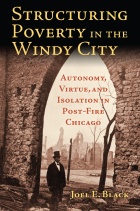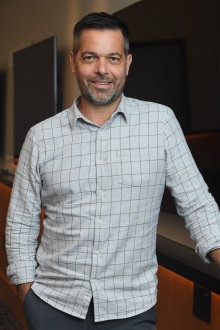Teaching the law in context
Joel Black, Undergraduate Lecturer in Law
Law, Joel Black points out, isn’t made out of thin air, and to understand how it works in society, there’s no substitute for putting the law in context.
That’s his historian’s eye at work. He joined the UB School of Law faculty this year where he’ll teach in the B.A. in Law program, guiding his students toward both a practical understanding of law and its application, and the situations out of which our legal system has arisen.
Black, who has a doctoral degree in social, legal and Constitutional history from the University of Florida, taught at the University of Oregon for six years, including in its School of Law’s undergraduate legal studies program, before returning to Gainesville to teach urban planning, political science and history. A native of Vancouver, British Columbia, he did his undergraduate work at the University of Victoria and earned a master’s in history from Concordia University in Montreal.
His initial courses in UB Law’s undergraduate program are Common Law—a historical survey of the origins of the common law system—and Legal Reasoning. “A lot of students are told, ‘You like to argue, you should go to law school,’” Black says. “But they need to learn to argue strategically and carefully. This course is about learning to think through legal questions and issues, and crafting a logic or a sequence or an argument that could win a case.”
That’s not an abstract task. “Laws and arguments don’t exist in a vacuum,” he says. “I bring in points, issues and readings that will flesh out some of the context of the case and pull it apart a little bit so students will see different perspectives.”

Purchase "Structuring Poverty in the Windy City: Autonomy, Virtue, and Isolation in Post-Fire Chicago" at University Press of Kansas.
Having served as an adviser to dozens of students (and also having coached the University of Florida’s undergraduate mock trial team), he knows that his students won’t all go on to law school. But he sees the undergraduate major as ensuring a solid understanding of law and courts that is beneficial to a professional career regardless of what graduates ultimately choose to do. “This program is an opportunity to connect students with their intellectual passions, but also with job market opportunities and outlets,” he says. “There’s so much work to do, and I’m excited to be part of the program as it grows.”
Black’s doctoral dissertation looked at the Northern “free labor” movement in Chicago at the turn of the 20th century, an ideology that anyone could climb the social and economic ladder through hard work. He returned to Chicago to research his book Structuring Poverty in the Windy City: Autonomy, Virtue, and Isolation in Post-Fire Chicago (University Press of Kansas), which examined how that city restructured its laws with a social-reform focus as it rebuilt after the Great Chicago Fire in 1871.
“The Chicago Tribune said the fire was the best thing that could have happened, because it required them to rebuild,” he says. “They rebuilt the physical city, but they also rebuilt the people to meet certain expectations. At the same time, there was a crisis of the law and the courts.”
Reformers and social scientists, Black says, set about using the tools of law to address social ills, such as the problem of fathers failing to pay child support, or the dangers faced by single young women in the big city. “Many of them wanted to make it better and help people, and the courts were trying to make that relevant,” he says. “These courts brought people in who might not otherwise engage with the law.
“I’m interested in the ways courts and laws engage ordinary people, how they structure the lives of ordinary people. And to some extent we’re still wrestling with these questions of good intentions and catastrophic results in other issues today.”
